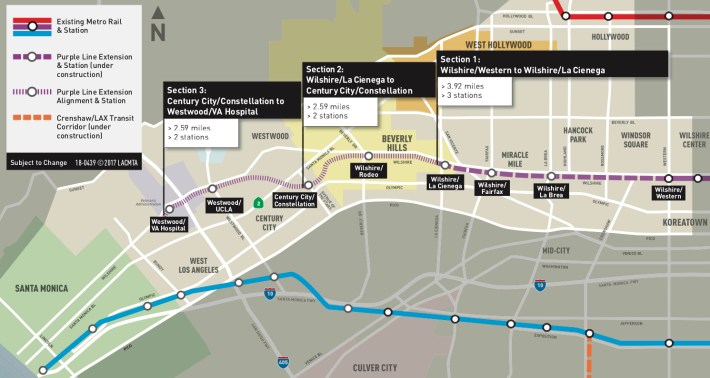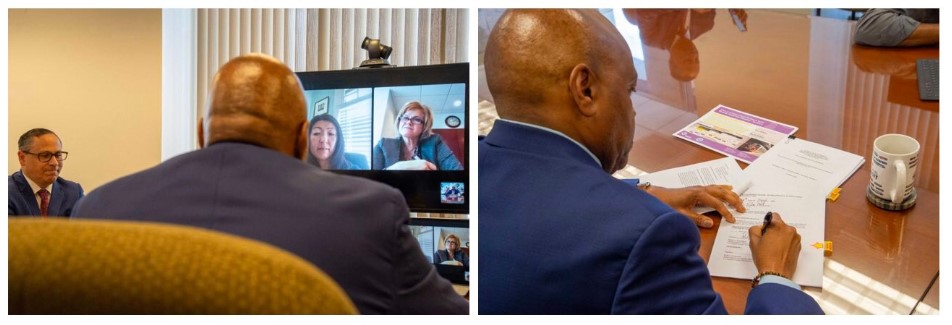Last week, Metro quietly signed a federal Full Funding Grant Agreement (FFGA) for $1.3 billion to construct the Westside Purple Line Extension Section 3. Though this comes after a delay of more than two years in the federal government disbursing congressionally-approved transit monies, it is nonetheless great news for Southern California mobility.
Overall the extensions will add nine miles of Westside Purple Line (now renamed the "D Line") subway, extending from Koreatown to Beverly Hills to West Los Angeles. Subway extension sections one and two are already under construction and are slated to open in 2023 and 2025, respectively. Phase three will extend the subway 2.6 miles from Century City to Westwood and the V.A. Hospital.

The FFGA was signed last week, according to a Metro CEO Phil Washington brief, shared on Twitter by Metro document sleuth @Numble:
Signing of the Full Funding Grant Agreement for WPLE Section 3
On Tuesday, March 17, I joined the Federal Transit Administration’s (FTA) Acting Administrator K. Jane Williams and FTA officials via tele-conference to sign the $1.3 billion Full Funding Grant Agreement (FFGA) for the Westside Purple Line Extension (WPLE) - Section 3. The Congressional 30-day review period for this FFGA, as mandated by the FAST Act, ended on March 11, 2020. Section 3 of the WPLE will extend this heavy rail line from the future Century City station to the planned Westwood/VA Hospital station at a total cost of $3.6 billion.
I want to personally thank all Metro Board Members and their staff for their strong and sustained support as we have worked together to advance an unprecedented four active FFGA’s for Los Angeles County; and a special thanks to Metro Government Relations-Federal Affairs Team for their persistence and tenacity throughout this process. I also want to extend my sincere appreciation to U.S. Senator Dianne Feinstein, U.S. Senator Kamala Harris, our entire LA County Congressional Delegation, U.S. Transportation Secretary Elaine Chao, Acting Administrator K. Jane Williams, FTA Region IX Administrator Ray Tellis and Director for Region IX Los Angeles Office Charlene Lee Lorenzo for working diligently to ensure this FFGA moved forward in a deliberate and effective manner. We will be working with our Board of Directors and U.S. Department of Transportation to determine a suitable time in the future to celebrate this final federal funding contribution that will complete construction of the WPLE.
A year or two ago, this would have been front page news.
Today it feels like a (another) stunt from an administration reluctant to actually support transit mobility, but now newly eager to push monies out to stimulate this nation's COVID-19-ravaged economy. For more than two years, the Trump administration withheld transit project funding approved by Congress, delaying transit infrastructure projects in L.A., Phoenix, Minneapolis, Durham, New York City, Milwaukee, Seattle, and elsewhere.
Since 2017, Metro has been pushing to get Section Three subway construction fully underway. This FFGA was expected in early 2018. As Metro-approved construction contracts threatened to go stale, the feds had been dangling the elusive FFGA approval in Metro's face, with some early preliminary approvals (a partial letter of no prejudice in late 2018) and plenty of excuses (in 2019 feds blamed the month-long government shutdown for the then year-long delay.) All along costs were escalating; Section Three was anticipated to run about $2-2.5 billion - now (in very uncertain times) the cost is estimated at $3.6 billion. In early February, Metro reported that the FFGA was about thirty days away from approval, but skeptical observers barely registered the development as news, because Metro leadership had been saying - for over a year - that approval was anticipated any day now.
Thank goodness those FFGA delays are finally history.
Now Metro faces the herculean task of getting subway construction underway in the face of an escalating pandemic. Though last week Metro CEO Washington stated that "construction is not impacted by COVID-19 at this time," that situation - like everything else - is changing daily. This week Metro reported that two construction contractors locally are reporting COVID-19 infections. Unknowns - from worker shortages to global supply chain disruptions - could spell delays.
Nonetheless, this is good news.






